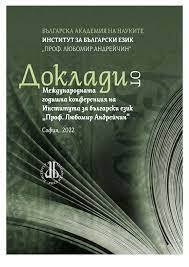Наивната аксиология в народния календар на българите
The Naive Axiology in the Folk Calendar of the Bulgarians
Author(s): Mariya Kitanova
Subject(s): Language studies, Language and Literature Studies, Theoretical Linguistics, Applied Linguistics, Lexis, Semantics, Philology
Published by: Институт за български език „Проф. Любомир Андрейчин“, Българска академия на науките
Keywords: naive axiology; chrononyms; unfavourable time; Wolf holidays; Mouse holidays; Rabbit day; Snake day; Bear day
Summary/Abstract: Traditionally, calendar time is viewed as a cyclic notion, which predetermines the existence of transitional periods serving as mythological and factual boundaries. In the majority of cases, these periods have negative symbolism as they are characterised by disturbance in the balance between heaven and earth, between the forces of cosmos and chaos. For these reasons, the periods of transition are regarded as dangerous and impure. The study titled “The Naive Axiology in the Bulgarian Folk Calendar” deals with a group of terms in Bulgarian calendar terminology – chrononyms denoting those periods and days in the Bulgarian folk calendar, which represent the most unfavourable time of the year according to folk beliefs. The paper addresses chrononyms formed with the roots: wolf – Вълчи празници (Wolf holidays), mouse – Миши празници (Mouse holidays), rabbit – Зайковден (Rabbit day), snake – Зъмски ден (Snake day), bear – Мечкин ден (Bear day). The semantic analysis studies each chrononym in the context of the system of holidays, prohibitions and preventive actions.
- Page Range: 414-420
- Page Count: 7
- Publication Year: 2022
- Language: Bulgarian
- Content File-PDF

